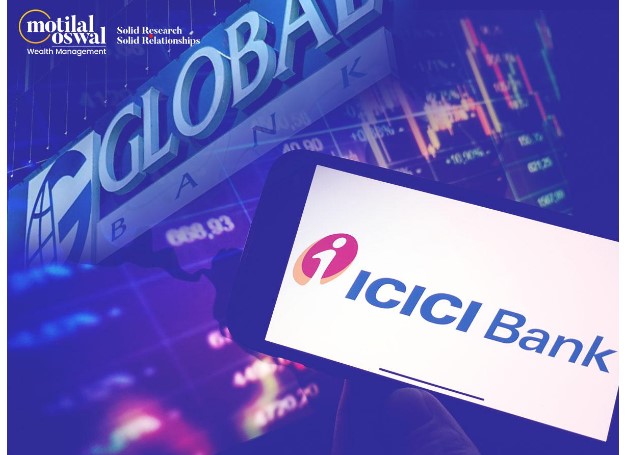The growth of the Indian economy relies on its strong banking sector. It is characterised by rapid digital transformation, financial inclusion and strong credit demand. Among all private sector banks in India, ICICI Bank has achieved leadership positions in the growing market.
Meanwhile, the global bank stock index follows major and mid-sized financial firms. These include banks, insurance, capital markets and financial services firms.
In this regard, this article aims to compare and contrast the performance of ICICI Bank share prices against global bank stock indices.
Overview of ICICI Bank Share Price
In 1994, ICICI Bank was formed, and later it became a core banking service provider in India. The bank offers services for retail, corporations and the management of wealth. As of 22nd May2025, the ICICI Bank share price is ₹1,429.
This valuation shows a rise of 15.95% in share price over the last three months and an increase of 11.86% over the past six months. However, the share price is subject to change due to market fluctuations. It is suggested that thorough research should be conducted before investing.
Global Bank Stock Indices
The MSCI World Banks Index and S&P Global Bank Index monitor the performance of the global banks' stocks. These indices help experts to monitor the health and direction of the international banking industry. For instance, the iShares Global Financials ETF (IXG) tracks global financial stocks, which cost about $107 as of 22nd May, 2025.
ICICI Bank Share Price Past Performance
The share price of ICICI Bank has gone up by almost 365.22% from 2020 to 2025. The company’s growth is shown by a nearly 36% compound annual growth rate (CAGR) which is much higher than the average for Indian banks.
Key drivers behind this exceptional performance include:
● Digital Transformation: ICICI Bank has heavily invested in digital infrastructure, with over 90% of savings account transactions through digital channels.
● Asset Quality Improvement: The bank’s gross non-performing asset (GNPA) ratio
dropped from 6.7% in FY18 to 2.2% in FY24, reflecting stronger credit risk management.
● Consistent Profitability: Net profits have increased over five years by roughly 22% annually, mainly driven by higher net interest and stable credit growth.
● Market Position: ICICI Bank is progressively growing in retail loans and deposits and at present is the second-largest private bank in India by its market capitalization.
Comparative Analysis: ICICI Bank vs. Global Bank Indices
When compared with international banking benchmarks, the ICICI Bank share price has significantly outperformed most global banks.
These factors are evaluated as:
● Over the last five years (2020–2025), the iShares Global Financials ETF (IXG) provided returns of 21%. This result is equivalent to a CAGR of around 5%
● The MSCI World Banks Index posted a five-year return of approximately 21%. This result is constrained by margin pressures, slow loan growth and regulatory pressure.
In contrast, ICICI Bank’s 365% gain in the same period underscores several competitive advantages:
● Economic Tailwinds: India’s GDP has grown at an average of 6.5% annually. This provides a stable environment for retail and corporate credit expansion.
● Demographic Leverage: India’s young population have boosted demand for digital banking, housing finance and consumer credit. In these areas, ICICI Bank has aggressively expanded.
● Regulatory Stability: Supportive policy measures from the Reserve Bank of India (RBI), such as liquidity support and favourable credit frameworks. This occurrence has aided banking sector growth without the regulatory uncertainty.
● Higher ROE and Profitability: ICICI Bank reported a Return on Equity (ROE) of 18.3% in FY25.
While global banking indices remain weighed down by macroeconomic uncertainty and legacy issues. ICICI Bank’s strong fundamentals and alignment with India’s growth strategy, which makes it a standout performer in the global banking landscape.
Implications for Investors
Since the ICICI Bank share price is much higher than global bank indices in recent years, investing in Indian banks appears more promising. Thus, including ICICI Bank in the investment portfolio, investors can gain a wider exposure to India's rising market. However, when deciding what to invest in, you should be aware of currency risks, geopolitics and global economics.
Conclusion
ICICI Bank’s share price has risen strongly, which is better than most global bank indexes. This trend proves that the ICICI Bank is doing well and India’s economy is positive. The bank gives investors an excellent way to access a lively and quickly growing market, which could lead to great profits as the global financial sector evolves.
FAQs
1. What factors could influence ICICI Bank’s future share price?
ICICI Bank’s stock has stood out because it has high earnings, good assets and pays attention to digital upgrades. On the other hand, many large banks encounter slower development, tougher rules and squeezed margins.
2. How much has the ICICI Bank share price grown in the past five
years?
Between 2020 and 2025, the price of ICICI Bank stock climbed by 365% at a CAGR of 36%. The percentage discovered is much greater than the 21% reported in the MSCI World Banks Index (US) over the same period.
3. What might determine the future share price of ICICI Bank?
Crucial elements are changes in India’s GDP, lending growth, the interest margin, regulations and digital progress. A positive environment for the economy and continued strong profits are expected to strengthen investor confidence.
4. How is ICICI Bank’s profitability measured against leading banks
around the world?
ROE for ICICI Bank rose to 18.3%, according to financial results for the year ended FY25. This result was approximately the same as the S&P Global 1200 Financials average, which was 17% in the same period.
5. Is ICICI Bank included in major global indices?
ICICI Bank is present in main international indices such as the MSCI Emerging Markets Index, FTSE All-World Index and several ESG indices. In the international market, ICICI Bank’s services are available in the United Kingdom, Canada, the United States, Singapore, Hong Kong and many more countries.


